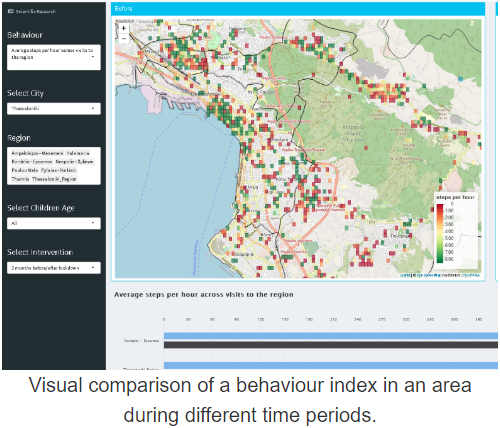CS Big Data project for strategies to combat childhood obesity recognised for its innovation potential
News
- CS News 2025
- SECURENET 2025
- EoI for Postdoctoral Fellowships 2025
- “Back to the Future” Advanced AI Careers Evening
- SOLARIS Shortlisted for Best Research Project at the 2025 Education Awards
- First global carbon neutral conference in ICT for Sustainability
- ARMOR: Advancing AI-Driven Security for 6G Open RAN Networks
- AI research and education at UCD and career opportunities in Ireland
- Political Bias on X before the 2025 German Federal Election
- A new Book co-authored by UCD CS Assoc. Prof. Madhusanka Liyanage Explores the Foundations and Applications of Mobile Edge Computing
- UCD NetsLab Leads a Global Consortium to Tackle 6G Security Challenges
- First students conferred with MSc in Cybersecurity
- Second Workshop on the Responsible Use of Generative AI in Research
- First BDIC Conference on Computer Science and Electrical/Electronics Engineering
- Paul Gillen - global leader in the fight against cyber crime
- CS students awarded Naughton Foundation Scholarships
- First Workshop on the Responsible Use of Generative AI in Research
- Dr Brett Becker (1976 - 2024)
- UCD Computer Science Researchers Receive ReCLAIM Award for GenAI Project
- MSc Cybersecurity Research Project Presentations 2024
- UCD BSc Computer Science Conferring 2024
- UCD NetsLab Launches ORAN Testbed to Advance Security and Privacy in Beyond 5G and 6G Networks
- UCD CS Netslab researchers in a global collaboration to bolster Zero Touch security and privacy for 6G networks
- UCD STEM Early Career Researchers Symposium
- EoI for Postdoctoral Fellowships 2024
- CS start-up a finalist in VentureLaunch Accelerator Programme
- University College Dublin Joins ROBUST-6G Project
- Cyberwise Cyber Security Shared Learning Day
- 2nd Summit on Security and Privacy in Future Mobile Networks (SECURENET) 2024
- Message from the Head of School
- Ulysses Medal Awarded to Professor Geoffrey Hinton: The Godfather of AI
- UCD CS academics invited to organise prestigious Dagstuhl seminars
- UCD College of Science Women in Science Mentoring Awards
- PhD Poster Event 2024
- “Back to the Future” Software Engineering Evening
- Improving resilience to the threat of coastal flooding
- Alumnus In Conversation - Fergal Reid, VP of AI at Intercom (PhD 2013)
- Computer Science Summer School
- Welcome to CS News 2023
- EoI for Postdoctoral Fellowships
- EU MSCA SE RE-ROUTE Project Kicks Off to Design Futuristic Multi-Modal Transportation Platform
- PhD Poster Event
- UCD wins at AI Ireland AI Awards
- UCDCS Athena SWAN Award
- Jan Łukasiewicz
- International Men’s Day
- 1st Year BSc Halloween Networking Event
- Ada Lovelace Energy Hackathon
- 5G for digital healthcare in COVID-19
- UCD CS Faculty Elected Vice Chair of ACM SIGCSE
- CS Big Data project for strategies to combat childhood obesity recognised for its innovation potential
- Welcome to CS News 2022
- UCD CS to host the 27th ACM Innovation and Technology in Computer Science Education
- UCD Computer Science Success in SFI Frontiers to the Future
- Why study Computer Science at UCD?
- CAMEO project receives funding from the Disruptive Technology Innovation Fund
- Congratulations to the Class of 2021 - MSc Forensic Computing & Cybercrime Investigation
- Computer Science Colleagues’ success in Interdisciplinary Research Scheme
- ML Labs Annual Newsletter
- Seagate CORTX Challenge
- UCD Academic awarded the 2021 Beijing Great Wall Friendship Award
- Recent funding successes and industry collaborations
- EU H2020 SPATIAL project
- recsyslabs - privacy preserving personalisation for publishers
- Congratulations to our recent PhD graduates
- UCD In Conversation: Cybercrime causes, trends, and prevention
- CS researchers partner in three successful Disruptive Technologies Innovation Fund projects
- Welcome to CS News, the new UCD CS magazine
- Congratulations to our recent PhD and research MSc graduates
- New book showcases digital forensic research by UCD law enforcement graduates
- Training the next generation of Computer Scientists
- Industry Partnership Event to showcase new research on using machine learning
- Poems that Solve Puzzles: The History and Science of Algorithms
- A welcome to incoming first year Computer Science students
- Zoom for Thought with Prof. Muthoni Masinde
- iPROCEEDS-2: Starting of the long-distance master programme on forensic computing and cybercrime investigation
- Short Term Contract Positions Opportunities
- Most Influential Paper Award at the 28th International Requirements Engineering Conference
- From the School of Medicine in partnership with the School of Computer Science
- 2nd Workshop on Implementing Machine Ethics on 30th June
- CeADAR receives Enterprise Ireland Funding for a new Supercomputer
- Assistant Professor Brett Becker awarded Research Fellowship
- UCD CS Masters Student wins prestigious Intel Student Scholarship
- Navigating COVID19 data with a little help from a tame data scientist
- PhD Positions
- UCD Computer Science Project Nominated for Two Education Awards
- Vacancies - Lecturer/Assistant Professor in Computer Science (x2)
- Ad Astra Fellows - Applications to Computer Science
- CALL OPEN - PhD Scholarships 2020 in Machine Learning
- Commissioner of An Garda Síochána visits the School of Computer Science for Conferring
- Computing Education Group SIGCSEire to launch in UCD on December 11th
- UCD Computer Science wins over €34m in Research Grants in 2018-19
- UCDCS Best Short Paper award 13th ACM Conference on Recommender Systems (RecSys)
- CS Sparks Programme
- CS Sparks

CS Big Data project for strategies to combat childhood obesity recognised for its innovation potential
The Horizon 2020 project, BigO, has been recognised for its highly innovative outputs and potential for further innovation. The project will be added to the Innovation Radar platform, where the EU highlights the projects which have been deemed ‘high potential’ for innovation. UCD was one of three partners in the project which were deemed to be ‘key innovators’.
Childhood and adolescent obesity is a major global and European public health problem. There are multiple and complex determinants of childhood obesity ranging from the socio-economic environment to individual behaviours but their role is not clearly understood. Too often, public actions are detached from local needs, including indiscriminate blanket policies and single-element strategies, limiting their efficacy and effectiveness. The need for community-targeted actions has long been obvious, but the lack of monitoring and evaluation framework and the methodological inability to objectively quantify the local community characteristics, in a reasonable timeframe, has hindered that.The BigO project set out to ask the question: Can new sensor technologies and big data help us collect evidence to inform and develop effective prevention efforts?
The project created a platform to use sensor technologies to record children’s daily eating and physical activity behaviour and correlate it with environment data from on-line sources.
During the project, BigO reached out to more than 25.000 school and age-matched obese children and adolescents from Greece, Ireland and Sweden as sources for community data. Widely spread sensors in smartphones or activity bracelets were used, in combination with Mandometer®, a clinically validated device monitoring the rate of food intake. Data as a whole included what and how children eat, how they move and sleep, along with characteristics of their urban, socioeconomic, commercial and school environment. Data driven analytics were then employed to extract relationships between environment, personal behaviour, obesity risk factors and obesity prevalence and determine which particular local conditions are associated with the development of obesity in children of a specific region.
Comprehensive models of the obesity prevalence dependence matrix were created, allowing for the first time data-driven effectiveness predictions about specific policies on a community and the real-time monitoring of the population response, supported by powerful real-time data visualisations. BigO provided an innovative new suite, allowing public health authorities to evaluate their communities based on their obesity prevalence risk and to take local action, based on objective evidence.
UCD Contribution School of Computer Science and Insight Centre for Data Analytics - Safe and Secure Data Collection and data storage (data warehouse)
For the BigO project to work, a large number of children and adolescents needed to use wearable technology and use an app multiple times a day. The data from this app was collected and analysed to gain insights into community environments. This collection of a large amount of data from multiple sensors worn by a large group of citizen scientists is a technical challenge. But when that data is health data, specifically health behaviour data from a vulnerable group (children and adolescents), the added security challenge is of paramount importance. UCD’s significant contribution to this project was the enabling of this data to be collected and warehoused in an ethically robust manner, protecting the security of the data and the anonymity of the participants. In health studies where multiple data sources provide different data points from the same person, the interplay of these data points can inadvertently lead to identification of the person, even if each data point is anonymised. Even if the identity of the person is not revealed, data might be used to locate a person, potentially making them vulnerable.

When designing the application, the UCD team minimised the channels through which data could be accessed. The app utilised existing security features in phone operating systems to isolate the data and code execution from other apps. The app storage was accessible only from the back-end of that mobile phone and contained only personal data of its owner. Within the app, any images which were irrelevant, potentially indecent or which identified the user, were deleted immediately. Data was anonymised in the app before being sent for processing. Both the time and location were anonymised and any information regarding journeys was generalised in order to prevent any reverse engineering of location. Once the data was synchronised/uploaded to the BigO server, it was deleted from the device.
The UCD team consisted of Professor Gerardine Doyle, Professor Tahar Kechadi (UCD project Lead), Arsalan Shahid, Tran Hong Ngoc, Thien-An Nguyen, Shane O’Donnell, and James O’Connor.
Innovation Radar
Following the successful completion of this project in 2021, the European Commission judged that BigO’s innovative features should be recognised on its Innovation Radar platform. Specifically UCD, Aristotle University, Thessaloniki, and the industry partner Cosmote Kinites Tilepikoinonies AE were named key innovators on the project. The Innovation Radar is a European Commission initiative to identify high potential innovations and innovators in EU-funded research and innovation projects. To allow for stakeholders to discover the outputs of EU innovation funding, the platform hopes to encourage the development of a dynamic ecosystem of incubators, entrepreneurs, funding agencies and investors that can help get EU-funded innovations faster to market. The platform identifies innovative projects from the independent expert reviewers, who already review ongoing EU-funded projects.
The BigO [(opens in a new window)https://cordis.europa.eu/project/id/727688] consortium brings together a team of schools, health and clinical scientists, public health authorities, researchers in data analytics and personal health systems, technology providers and mobile communication providers. The 13 European partners are from Greece, Sweden, Ireland, Spain and the Netherlands. The coordinator was Anastasios Delopoulos from Aristotle University of Thessaloniki in Greece.
Budget €4.1 million.
Grant agreement ID: 727688
Published 13.06.22